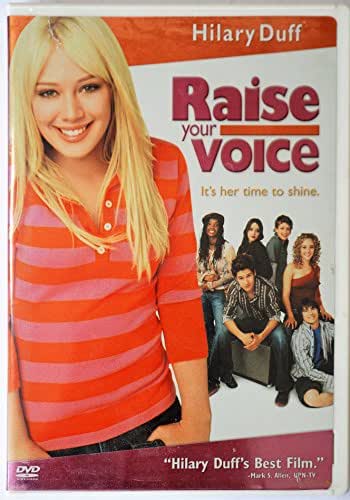**/**** Image A- Sound B+ Extras C-
starring Hilary Duff, Rita Wilson, David Keith, Jason Ritter
screenplay by Sam Schreiber
directed by Sean McNamara
by Travis Mackenzie Hoover The best one can say for Raise Your Voice is that it was made with non-toxic materials–your impressionable 'tween will not be exposed to any really reprehensible behaviour. It's not a disguised infomercial for crass capitalism, it's not leeringly inappropriate in its sexual attitudes, and, save for a somewhat-patronized struggling black character, its politics are vague and inoffensive. Granted, this doesn't preclude Raise Your Voice from positing an alternate universe where music conservatories teach scratching and rock guitar, or wrapping up huge traumatic events with the ease of turning on a light, but the film does keep you from becoming disgusted with the corruption of kids' entertainment. You may feel bored and bewildered, but never disgusted.
Predictably, the world is sanitized for a dull adolescent's protection. Hilary Duff's Terri is one of those teen-movie musical marshmallows pelted with compliments for being perfectly mediocre, thus her rendezvous with a prestigious "summer music conservatory" seems assured, especially after the disc her loving brother (Jason Ritter) has put together. But it wouldn't be 'tween if there weren't contrived tragedy, so her poor sibling perishes when a drunk driver sideswipes their car. Though Terri feels irrationally guilty and her Dead Poets Society father (David Keith) refuses to send her to the program, her mother and aunt (Rita Wilson and Rebecca De Mornay) tell a lie that lands Terri straight in Los Angeles and musical heaven.
Critics live to savage movies like this, but there's nothing offensive enough here to warrant it. Of course Terri has trouble fitting in; of course she struggles to find her musical mojo; of course she has to get past her misplaced guilt. But try as one might, there's no isolating the depressing attitudes that trap teensploitation between puritanical terror and barely-disguised sexual exploitation. The biggest sin of Raise Your Voice is its pandering to a sadly mainstream sensibility: it imagines the closing ceremony at a prominent music school as a community-theatre production of Fame, and it allows Terri's suave Brit love interest (Oliver James) to pass as dangerous with his wussy pretend-Mohawk.
Still, refusing to poison young minds is no big comfort if you don't challenge them, either. The film's facile, no-sweat approach to Terri's agony seriously damages its credibility as drama: a real movie wouldn't be as mechanical in its processing of her trauma, as though everything in life can be solved by following the Syd Field paradigm. Really good movies for young people open the world up instead of forcing it into formats, which is why I remember My Own Private Idaho from my high school days better than I do whatever late-'80s/early-'90s teen swill surrounded it. While Raise Your Voice doesn't exploit the children, neither does it sufficiently address the pain and confusion welling up in their bodies and minds. It won't hurt them, but it will leave them largely the same–something we should resent in kidpix as much as in adult ones.
THE DVDIf the 2.35:1, 16×9-enhanced image on New Line's DVD release of Raise Your Voice is just a little soft in the definition department, vibrant and cleanly delineated colours balance things out a bit. (A fullscreen version occupies the flipside.) The Dolby Digital 5.1 audio is meanwhile surprisingly light on surround usage, particularly for a film centred on music–though they admittedly pull out the discrete-channel stops for the climactic graduation concert scene. The tone is crisp and full and unimpeachable otherwise. Extras are as follows:
Behind the Scenes Featurette (7 mins.)
Director Sean McNamara and the cast talk about how great everyone was and how music is essential for a happy life. Par-for-the-course promotional blather with no real substance.
Music Video: "Fly" (4 mins.)
A rather unimaginative video in which Duff, clad in a Strokes T-shirt and black jeans, works an idolatrous concert crowd. I suppose it will give Duff fans more of what they want, which is adoration of their heroine with a minimum of bells and whistles.
Orchestra Sequence (1 min.)
A strange afterthought in which footage of an orchestra scoring the film is intercut with clips from the movie. Hard to see why they bothered.
Deleted Scenes
Five deleted or extended scenes, largely reliant on exposition, none of which greatly impact your understanding of the film and all of which were definitely ripe for excision or shortening. The only standout is a student jam session happened on by a bemused Duff.
Outtakes (4 mins.)
Those who convulse at this sort of thing will find it the sort of thing that convulses them. Everyone else should find it easily skipped.
Interactive Music Game
By far the most bizarre interactive feature I've encountered, this promises to make you a composer while merely asking you to select the instruments for a jam session. The resulting music is unremarkable and the teacher "critiques" are predictably you-go-girl in tone.
Rounding out the package: a DVD-ROM photo gallery; weblinks; the film's trailer; and trailers for Son of the Mask, A Cinderella Story (along with its soundtrack CD), Secondhand Lions, How to Deal, and The Notebook.
107 minutes; PG; 2.35:1 (16×9-enhanced), 1.33:1; English DD 5.1, English Dolby Surround; CC; English, Spanish subtitles; DVD-9; Region One; New Line




![I Am Sam (2001) [New Line Platinum Series] - DVD I Am Sam (2001) [New Line Platinum Series] - DVD](https://i0.wp.com/filmfreakcentral.net/wp-content/plugins/contextual-related-posts/default.png?resize=150%2C150&ssl=1)